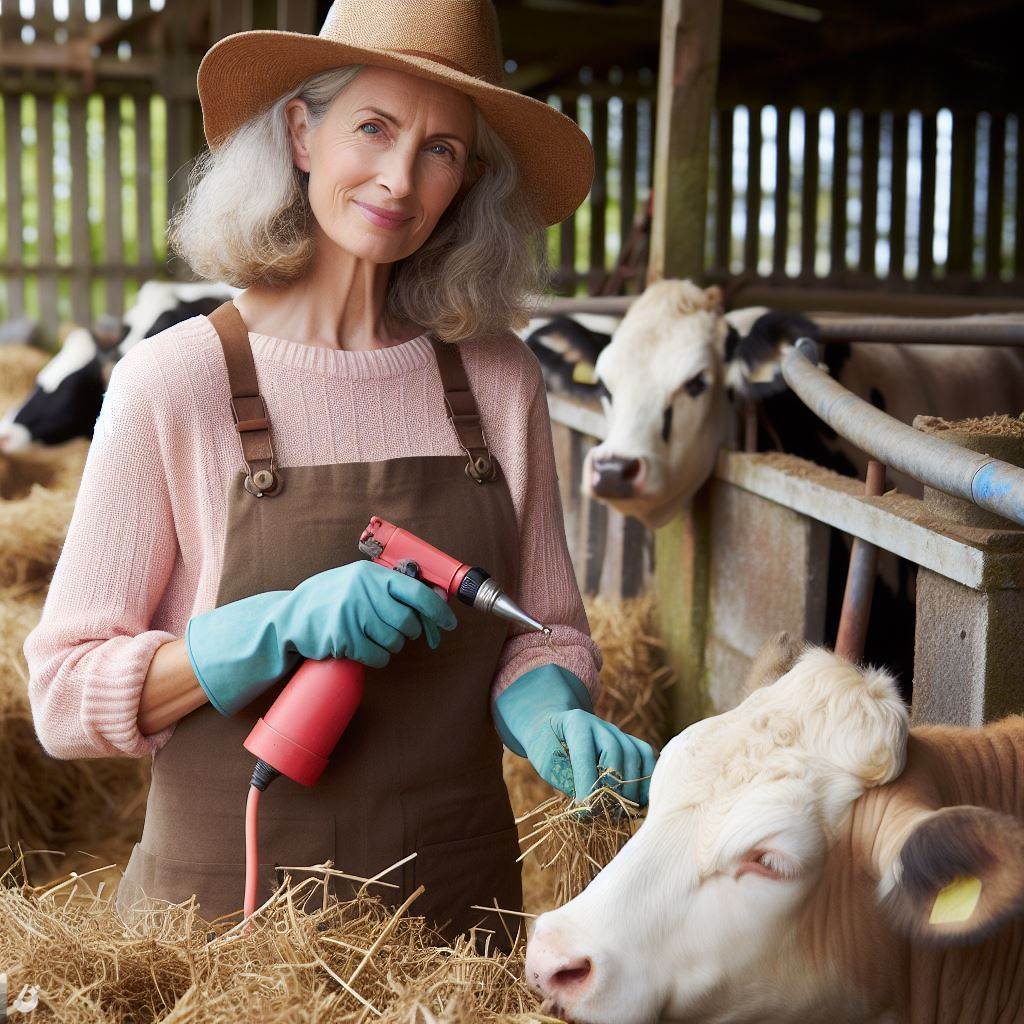Introduction
Embracing AI, UK farm management undergoes a transformative evolution. Innovative technologies redefine efficiency, sustainability, and productivity.
- Precision Agriculture Revolutionized: AI empowers precision farming, optimizing resource utilization and enhancing crop yield with pinpoint accuracy.
- Smart Decision-Making with Data: Harnessing big data, AI facilitates informed decisions, providing real-time insights for improved crop management strategies.
- Automated Monitoring for Livestock Welfare: AI-driven monitoring ensures the well-being of livestock, alerting farmers to potential issues promptly.
- Predictive Analytics in Crop Health: AI predicts and prevents crop diseases, minimizing losses and fostering a proactive approach to agricultural challenges.
- Streamlined Supply Chain Management: AI optimizes supply chain processes, from harvest to distribution, ensuring seamless operations and reducing wastage.
The integration of AI heralds a new era for UK agriculture, where innovation and efficiency converge for sustainable, data-driven farm management
Current Challenges in UK Farm Management
Labor Shortage in Agricultural Sector
- Farms face a critical shortage of skilled labor, impacting productivity.
- The traditional workforce is declining, creating a pressing need for innovative solutions.
- Recruitment challenges persist, prompting a reevaluation of labor management strategies.
Increasing Complexity of Farm Operations
- Modern farming involves multifaceted operations, demanding enhanced organizational skills.
- Crop diversification and technological integration contribute to operational intricacies.
- Farm managers navigate a dynamic landscape, requiring adaptability and efficient resource allocation.
Climate Change and its Impact on Farming
- Unpredictable weather patterns pose a significant threat to agricultural stability.
- Rising temperatures and extreme weather events jeopardize crop yields and livestock health.
- Sustainable practices become imperative to mitigate climate-induced risks and ensure long-term resilience.
Need for Advanced Technology to Enhance Efficiency
- Technology emerges as a crucial ally, addressing labor shortages and operational complexities.
- AI-driven solutions offer precision in resource management and optimize production processes.
- Integrating robotics and smart sensors boosts efficiency, laying the foundation for a technologically advanced farming sector.
Navigating challenges, UK farm management pivots. Imperatively, it adopts AI and advanced technologies, ensuring a resilient agricultural future.
Overview of AI in Farm Management
Definition and Explanation of AI in the Context of Agriculture
Artificial intelligence (AI) refers to the simulation of human intelligence in machines that are programmed to think and learn like humans.
In the context of agriculture, AI involves the use of advanced technologies to enhance farm management practices.
Farm management encompasses all activities involved in running a farm, including planning, organizing, supervising, and controlling various farm operations.
With the integration of AI, these processes can be more efficient, accurate, and sustainable.
Importance of AI in Addressing the Challenges Faced in UK Farm Management
Increasing Efficiency and Productivity
AI technologies such as machine learning, robotics, and predictive analytics can significantly improve the efficiency and productivity of farm management in the UK.
These technologies can automate labor-intensive tasks, optimize resource allocation, and provide real-time decision support based on data analysis.
For example, AI-powered robots can perform tasks such as planting, harvesting, and weed control more precisely and efficiently than manual labor.
This reduces the need for human intervention, saves time, and increases overall productivity.
Enhancing Crop and Livestock Management
AI can revolutionize crop and livestock management by analyzing large volumes of data collected from sensors, satellites, and other sources.
By analyzing this data, AI algorithms can provide valuable insights on factors such as soil moisture, temperature, crop health, and animal behavior.
These insights help farmers make informed decisions related to irrigation, fertilization, disease detection, and animal welfare.
By proactively identifying potential issues, AI enables farmers to take timely corrective actions, resulting in improved crop yields, higher-quality produce, and healthier livestock.
Optimal Resource Utilization
AI can optimize the use of resources such as land, water, fertilizers, and energy in UK farm management.
By analyzing various factors like weather patterns, soil conditions, and crop requirements, AI algorithms can determine the most efficient ways to utilize these resources.
For instance, AI can determine the optimal irrigation schedule based on weather forecasts, soil moisture levels, and crop water requirements.
This not only ensures water conservation but also prevents over-irrigation, which can lead to nutrient leaching and environmental pollution.
Sustainable Farming Practices
Addressing sustainability challenges is crucial in modern farm management.
AI can contribute to sustainable farming practices by facilitating precision agriculture, reducing environmental impact, and promoting biodiversity.
Precision agriculture involves the targeted application of inputs such as fertilizers and pesticides based on specific crop needs.
AI enables precise monitoring and analysis of crop data, allowing farmers to apply these inputs only where and when necessary.
This reduces unnecessary chemical usage, minimizes pollution, and promotes eco-friendly farming practices.
Furthermore, AI can assist in the implementation of biodiversity conservation strategies.
By analyzing data on wildlife habitats and migration patterns, AI algorithms can provide insights on how to minimize disturbances and protect biodiversity within and around farms.
Improved Risk Management
AI can enhance risk management in UK farm management by predicting and mitigating potential risks such as diseases, weather events, price fluctuations, and market uncertainties.
By analyzing historical data, AI algorithms can identify patterns and make accurate forecasts.
Personalized UK Career Consulting
Receive tailored career guidance designed just for you. Get actionable steps and expert support to boost your career in 1-3 days. Take control of your career now.
Get StartedFor example, AI can predict disease outbreaks by analyzing data on climatic conditions, pest populations, and plant characteristics.
Farmers can then take preventive measures such as targeted pest control, early detection, and quarantine to minimize the impact of diseases on crops and livestock.
AI can revolutionize UK farm management, increasing efficiency, enhancing crop and livestock management, optimizing resource use, promoting sustainability, and improving risk management.
Embracing AI technologies can help address the challenges faced in UK farm management and ensure a more productive, sustainable, and profitable future for the agricultural industry.
Applications of AI in UK Farm Management
Precision Farming and Crop Management
- Drones and sensors collect data, providing real-time insights for informed decision-making.
- AI algorithms analyze data, optimizing crop production through precise resource allocation.
Livestock Management
- AI-powered systems monitor animal health and behavior, ensuring proactive and personalized care.
- Predictive analytics, fueled by AI, aid in disease prevention and early detection, safeguarding livestock well-being.
Farm Machinery and Robotics
- AI-enabled automation transforms routine tasks, enhancing efficiency and reducing labor demands.
- Autonomous vehicles, guided by AI, revolutionize crop harvesting and maintenance, streamlining farm operations.
In the realm of UK farm management, AI emerges as a transformative force. Precision farming harnesses drones and sensors, empowering data-driven decisions.
Livestock management experiences a paradigm shift, with AI ensuring health and predicting ailments.
Farm machinery, embracing AI, achieves unprecedented automation, paving the way for a technologically advanced and efficient agricultural landscape.
Read: Aquatic Health Management by UK Experts

Benefits of AI in UK Farm Management
Increased efficiency and productivity
- AI technologies like robots and drones can automate various tasks, reducing manual labor.
- By streamlining operations, AI systems can increase the overall efficiency and productivity of farms.
- Automated monitoring systems can provide real-time data, allowing farmers to make timely decisions.
- AI can analyze complex patterns and optimize workflows, leading to faster and more accurate farm management.
- Efficient farm management through AI can result in higher crop yields and profits for UK farmers.
Optimized resource utilization and reduced waste
- AI-powered sensors can monitor soil conditions, weather patterns, and crop health, ensuring optimal resource allocation.
- Through AI algorithms, farms can precisely determine the required amount of fertilizers, water, and pesticides.
- Reduced use of resources not only saves costs but also minimizes environmental impact and promotes sustainability.
- AI can analyze data from multiple sources and predict potential yield losses, enabling proactive measures.
- By optimizing resource usage, AI helps in minimizing waste and maximizing the overall efficiency of farming operations.
Improved decision-making based on real-time data analysis
- AI systems can collect and analyze vast amounts of data from various sources, including sensors and satellite imagery.
- Real-time data analysis allows farmers to monitor and respond to changing conditions promptly.
- By identifying patterns and trends, AI can provide valuable insights for better decision-making.
- AI-powered predictive models can anticipate market demand, enabling farmers to optimize production and distribution.
- With accurate data analysis, farmers can make informed decisions and mitigate risks effectively.
Enhanced sustainability through precision farming
- AI technology enables precision farming techniques, minimizing the use of resources and reducing environmental impact.
- Through AI, farmers can precisely apply fertilizers and pesticides only where and when needed, avoiding excessive use.
- AI-powered smart irrigation systems can optimize water usage and minimize water wastage.
- By monitoring soil and weather conditions, AI can help farmers adopt sustainable farming practices.
- Overall, AI contributes to the long-term sustainability of UK farms by reducing inputs and preserving natural resources.
Essentially, the benefits of AI in UK farm management are significant.
Increased efficiency and productivity, optimized resource utilization, improved decision-making, and enhanced sustainability are just a few advantages that AI brings to the agricultural sector.
By harnessing the power of AI technologies, UK farmers can revolutionize their farming operations and contribute to a more efficient, sustainable, and profitable agriculture industry.
Read: UK Aquaculture Technician: Career FAQs
Challenges and Limitations of AI in UK Farm Management
Initial investment and implementation costs
The adoption of AI in farm management requires significant financial resources for technology acquisition and infrastructure development.
Lack of technical expertise among farmers
Many farmers lack the necessary skills and knowledge to fully utilize AI systems and may require training and support.
Concerns about data security and privacy
With the increasing reliance on AI, the collection and storage of farm data raise concerns about its security and potential misuse.
Ethical considerations regarding animal welfare in AI-driven livestock management
In AI-driven livestock management, ethical considerations surrounding animal welfare demand unwavering attention.
Implementing ethical AI practices ensures the well-being of livestock, fostering sustainable and responsible farming practices.
- Transparent Decision-Making: AI algorithms should transparently disclose decision-making processes, enhancing accountability and fostering trust among farmers and consumers alike.
- Continuous Monitoring: Ethical AI promotes real-time monitoring of livestock conditions, enabling swift intervention in case of health or behavioral issues.
- Data Privacy: Protecting sensitive data is paramount. AI applications must adhere to stringent privacy standards, safeguarding both farmer and animal information from misuse.
- Avoiding Bias: Strive for fairness in AI models to prevent bias that might adversely affect certain groups of animals. Fair treatment is crucial for maintaining ethical standards.
- Human Oversight: AI should complement, not replace, human judgment. Maintaining a balance between automated processes and human intuition ensures a holistic approach to animal care.
- Compliance with Regulations: Adherence to existing animal welfare regulations is non-negotiable. AI-driven systems must align with established standards, promoting responsible farming practices.
- Stakeholder Involvement: Inclusive decision-making involving farmers, veterinarians, and ethical experts is imperative. Collaboration ensures diverse perspectives, contributing to well-rounded ethical frameworks.
Ethical considerations form the foundation, guiding AI-driven livestock management to align technological advancements with compassionate, responsible animal care.
Read: Sustainable Practices in UK Aquaculture Tech
Explore Further: Agritech Trends Impacting UK Farm Managers
Delve into the Subject: Technology’s Impact on Modern UK Farming
Your Dream Job Starts with a Perfect CV
Get a tailored CV and cover letter that captures your unique strengths and stands out in your industry. Let us help you make an unforgettable first impression.
Get StartedFuture Prospects and Adoption of AI in UK Farm Management
Partnerships between AI technology companies and agricultural organizations
- Collaboration between AI technology companies and agricultural organizations can lead to innovative solutions for farm management.
- By combining AI expertise with agricultural knowledge, these partnerships can develop customized AI tools for specific farming needs.
- Data-driven insights provided by AI can help agricultural organizations make informed decisions to optimize farm productivity.
Government initiatives to promote AI adoption in agriculture
- The UK government recognizes the potential of AI in transforming the agricultural sector and has launched initiatives to support its adoption.
- Funding schemes are available to encourage farmers to integrate AI technologies into their farming practices.
- Government programs also provide training and resources to ensure farmers are equipped with the necessary skills to utilize AI effectively.
Potential advancements and integration of AI technologies in farm management
- AI-powered drones can be used for precision agriculture, collecting real-time data on crop health and identifying areas in need of attention.
- Machine learning algorithms can analyze data from sensors and weather stations to predict optimal irrigation and fertilization practices.
- Virtual assistants powered by AI can provide farmers with instant access to information and recommendations for farm management tasks.
- AI-powered robots can automate labor-intensive tasks such as harvesting, reducing the reliance on manual labor.
- Blockchain technology combined with AI can enhance traceability and transparency in the food supply chain, ensuring quality and safety.
Most importantly, the future prospects for AI in UK farm management are promising.
Through partnerships between AI technology companies and agricultural organizations, customized AI solutions can be developed to optimize farm productivity.
The government’s support through funding schemes and training programs facilitates the adoption of AI in agriculture.
The integration of AI technologies such as drones, machine learning, virtual assistants, and robots offers significant advancements in farm management practices.
With these advancements, the UK agricultural sector can benefit from increased efficiency, sustainability, and competitiveness in the global market.
By embracing AI, UK farmers can stay at the forefront of technological innovation and ensure the long-term success of their farming operations.
Read: Aquaculture in the UK: Education Pathways
Uncover the Details: Managing a UK Farm: Health & Safety Tips
Conclusion
Recap of the role of AI in UK farm management
Artificial Intelligence (AI) plays a significant role in UK farm management, helping farmers make informed decisions and optimize their operations.
The potential of AI in addressing challenges and revolutionizing the agriculture sector
AI has the potential to address various challenges faced by UK farmers, such as labor shortages, crop diseases, and climate change.
Moreover, it can revolutionize the agriculture sector by increasing yields, reducing costs, and ensuring sustainable practices.
Final thoughts on the importance of embracing AI in UK farming
Embracing AI in UK farming is crucial for the industry’s future success and competitiveness. It can enhance productivity, efficiency, and sustainability, ensuring food security and economic growth.
Farmers should embrace this technology to stay ahead in the ever-evolving agricultural landscape.
AI offers immense opportunities for UK farm management.
With its ability to analyze vast amounts of data, provide accurate predictions, and enable autonomous decision-making, AI can transform the way farmers operate.
By embracing AI, farmers can overcome challenges and revolutionize the agriculture sector, ultimately leading to a more sustainable and prosperous future.
[E-Book for Sale]
500 Cutting-Edge Tech Startup Ideas for 2024 & 2025: Innovate, Create, Dominate
$19.99 • 500 Tech Startup Ideas • 62 pages
You will get inspired with 500 innovative tech startup ideas for 2024 and 2025, complete with concise descriptions to help you kickstart your entrepreneurial journey in AI, Blockchain, IoT, Fintech, and AR/VR.




